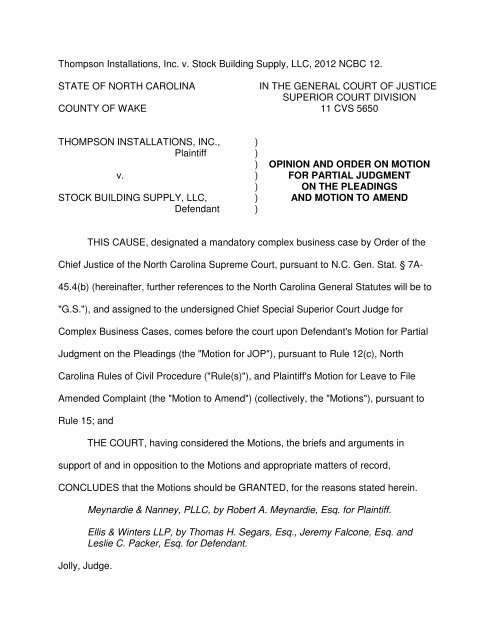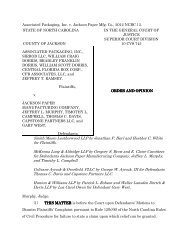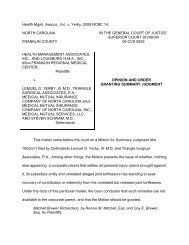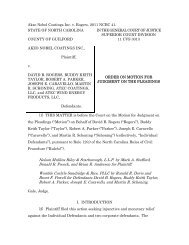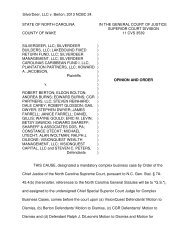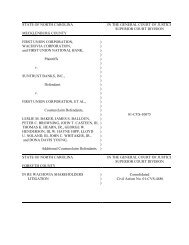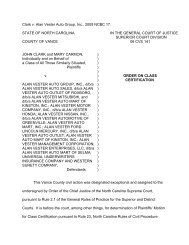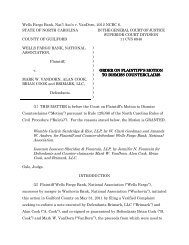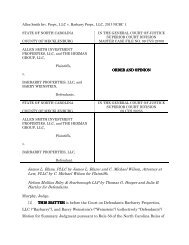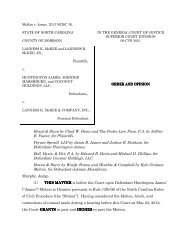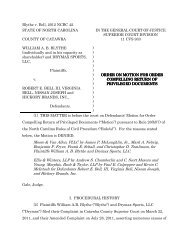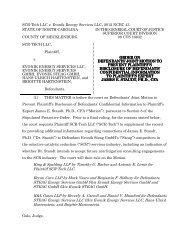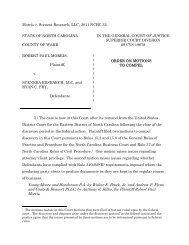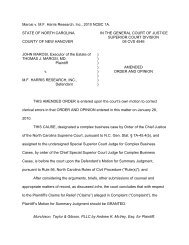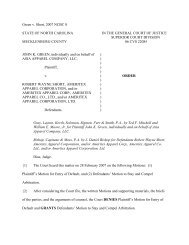thompson installations, inc. v. stock building supply, llc 2012 ncbc 12
thompson installations, inc. v. stock building supply, llc 2012 ncbc 12
thompson installations, inc. v. stock building supply, llc 2012 ncbc 12
Create successful ePaper yourself
Turn your PDF publications into a flip-book with our unique Google optimized e-Paper software.
Thompson Installations, Inc. v. Stock Building Supply, LLC, <strong>20<strong>12</strong></strong> NCBC <strong>12</strong>.STATE OF NORTH CAROLINAIN THE GENERAL COURT OF JUSTICESUPERIOR COURT DIVISIONCOUNTY OF WAKE 11 CVS 5650THOMPSON INSTALLATIONS, INC., )Plaintiff )) OPINION AND ORDER ON MOTIONv. ) FOR PARTIAL JUDGMENT) ON THE PLEADINGSSTOCK BUILDING SUPPLY, LLC, ) AND MOTION TO AMENDDefendant )THIS CAUSE, designated a mandatory complex business case by Order of theChief Justice of the North Carolina Supreme Court, pursuant to N.C. Gen. Stat. § 7A-45.4(b) (hereinafter, further references to the North Carolina General Statutes will be to"G.S."), and assigned to the undersigned Chief Special Superior Court Judge forComplex Business Cases, comes before the court upon Defendant's Motion for PartialJudgment on the Pleadings (the "Motion for JOP"), pursuant to Rule <strong>12</strong>(c), NorthCarolina Rules of Civil Procedure ("Rule(s)"), and Plaintiff's Motion for Leave to FileAmended Complaint (the "Motion to Amend") (collectively, the "Motions"), pursuant toRule 15; andTHE COURT, having considered the Motions, the briefs and arguments insupport of and in opposition to the Motions and appropriate matters of record,CONCLUDES that the Motions should be GRANTED, for the reasons stated herein.Jolly, Judge.Meynardie & Nanney, PLLC, by Robert A. Meynardie, Esq. for Plaintiff.Ellis & Winters LLP, by Thomas H. Segars, Esq., Jeremy Falcone, Esq. andLeslie C. Packer, Esq. for Defendant.
PROCEDURAL HISTORY[1] On April 11, 2011, Plaintiff Thompson Installations, Inc. ("Thompson") filedits Verified Complaint (the "Complaint") in this civil action against Defendant StockBuilding Supply, LLC ("Stock").[2] Plaintiff alleges the following causes of action ("Claim(s)"): First Claim –Breach of Contract, Second Claim – Breach of Contract and Third Claim – Unfair TradePractices/Unlawful Restraint on Trade.[3] On June 13, 2011, Defendant filed an Answer.[4] On July 6, 2011, Defendant filed the Motion for JOP.[5] The Motion for JOP seeks judgment in Defendant's favor on Plaintiff'sThird Claim – Unfair Trade Practices/Unlawful Restraint on Trade (the "Chapter 75Claim").[6] On September 27, 2011, the court heard oral argument on the Motion forJOP.[7] On December 8, 2011, Plaintiff filed the Motion to Amend, seeking to addmore specific factual allegations to the Complaint in support of its Claims.[8] The Motions have been fully briefed and are ripe for determination.FACTUAL BACKGROUNDAmong other things, the Complaint 1 alleges that:[9] Plaintiff is a North Carolina corporation with its pr<strong>inc</strong>ipal office located inWake County, North Carolina. 21 For purposes of considering the Motions, the court will refer to the allegations of the proposed AmendedComplaint, attached as Exhibit A to Plaintiff's Motion to Amend.
[10] Defendant is a North Carolina limited liability company with its pr<strong>inc</strong>ipaloffice located in Wake County, North Carolina. 3[11] Plaintiff is in the business of installing doors and windows. 4[<strong>12</strong>] Defendant is in the business of selling <strong>building</strong> supplies, <strong>inc</strong>luding doorsand windows. 5Defendant is the largest supplier of installed windows and doors in theRaleigh, Durham and Chapel Hill areas. 6[13] On or about July 15, 2005, Plaintiff and Defendant entered into anagreement (the "Contract") whereby Plaintiff agreed to act as an independent contractorfor the installation of doors and windows supplied by Defendant. 7[14] The Contract was to be "non-exclusive," meaning that either party waspermitted to enter into similar agreements with competitors of the other party. 8[15] The Contract was also terminable by either party at any time as to futurejobs. 9In other words, the Contract was terminable on a job-by-job basis.[16] After entering into the Contract, Defendant's employees and agents toldPlaintiff that it was not permitted to engage in installation services for Defendant'scompetitors. 10[17] On several occasions, Plaintiff was approached by competitors ofDefendant’s competitors and asked to perform installation services. 11 On each suchoccasion, Plaintiff requested permission from Defendant to perform services for those2 Amd. Compl. 1.3 Id. 2.4 Id. 3.5 Id. 4.6 Id. 16, 33.7 Id. 5.8 Id. 7, Ex. A 1.H.9 Id. Ex. A.10 Id. 9.11 Id. 10.
competitors. Defendant told Plaintiff that such conduct was against Defendant's policy,and the Contract would be terminated if Plaintiff performed work for Defendant'scompetitors. <strong>12</strong>[18] On one occasion, Plaintiff was directed to terminate its own subcontractorbecause the subcontractor was performing work for one of Defendant's competitors. 13[19] At all times relevant to this action, Defendant was providing Plaintiff withmore than 200 installation jobs per week, while Defendant's competitors were providingPlaintiff with less than twenty (20) installation jobs per week. 14DISCUSSIONPlaintiff's Motion to Amend[20] Plaintiff's Motion to Amend seeks to add more factual allegations tosupport its Claims, primarily relating to Plaintiff's Chapter 75 Claim.[21] Defendant opposes the Motion to Amend to the extent it seeks to addallegations related to the Chapter 75 Claim. Defendant does not oppose the Motion toAmend to the extent the added allegations relate to the breach of contract Claims.[22] Pursuant to Rule 15(a), leave to amend a pleading "shall be freely givenwhen justice so requires." See, e.g., Pickard v. Pickard, 176 N.C. App. 193, 195 (2006)("Rule 15(a) contemplates liberal amendments to the pleadings, which should always beallowed unless some material prejudice is demonstrated.").[23] Consistent with the liberal standard of Rule 15, the court concludes thatPlaintiff's Motion to Amend should be GRANTED.<strong>12</strong> Id. 11.13 Id. 14.14 Id. 19.
Defendant's Motion for JOP[24] Defendant seeks judgment in its favor on Plaintiff's Chapter 75 Claim.Defendant contends that the substance of Plaintiff's First and Second Claims is allegedbreach of contract and that North Carolina law does not recognize Chapter 75 liabilityfor a simple breach of contract. 15[25] Plaintiff responds by arguing that the nature of Defendant's breach ofcontract was "anti-competitive" and coercive, which Plaintiff contends is sufficientconduct to support its Chapter 75 Claim. 16In essence, Plaintiff argues that Defendant'sconduct went far beyond a mere breach of contract. 17[26] In its responsive brief and at oral argument, Plaintiff put forth two separatetheories of Defendant's liability under Chapter 75 – arguing that both G.S. 75-1.1 and75-2 support its Chapter 75 Claim. As such, the court in turn addresses both theories ofliability below.Legal Standard[27] In considering a motion for judgment on the pleadings under Rule <strong>12</strong>(c),the court will grant the motion if "no material issue of fact remains to be resolved" and"the movant is entitled to judgment as a matter of law." Groves v. Cmty. Hous. Corp. ofHaywood Cnty., 144 N.C. App. 79, 86-87 (2001) (citations omitted). Further, the courtwill "view the facts and permissible inferences in the light most favorable to the nonmovingparty [ ], taking all well-pleaded factual allegations in the non-moving party'spleadings as true." Id. The standard of review for a Rule <strong>12</strong>(c) motion is the same asfor a motion to dismiss under Rule <strong>12</strong>(b)(6). Akzo Nobel Coatings Inc. v. Rogers, 201115 Mem. Supp. Stock's Mot. Partial J. Pleadings 2.16 Pl. Resp. Def. Mot. Partial J. Pleadings 5.17 Id.
NCBC 41, 32 (N.C. Super. Ct. Nov. 3, 2011). The function of Rule <strong>12</strong>(c) is to "disposeof baseless claims or defenses when the formal pleadings reveal their lack of merit" asa matter of law. Id. (quoting Ragsdale v. Kennedy, 286 N.C. 130, 137 (1974)).Liability Under G.S. 75-1.1[28] Plaintiff contends that Defendant is exposed to liability to it under Plaintiff'sChapter 75 Claim because Defendant allegedly engaged in unfair methods ofcompetition or unfair or deceptive acts or practices in the course of its business dealingswith Plaintiff. Defendant argues that in substance this civil action is simply a breach ofcontract claim and that Plaintiff's Chapter 75 Claim fails as a matter of law.[29] As envisioned by G.S. 75-1.1, "[A] practice is unfair when it offendsestablished public policy as well as when the practice is immoral, unethical, oppressive,unscrupulous, or substantially injurious to consumers." Eastover Ridge, L.L.C. v. MetricConstructors, Inc., 139 N.C. App. 360, 367 (2000) (quoting Warfield v. Hicks, 91 N.C.App. 1, 8 (1988)). An unfair act or trade practice is committed where the party "engagesin conduct manifesting an inequitable assertion of power or position." Gray v. N.C. Ins.Underwriting Assocs., 352 N.C. 61, 68 (2000). "The 'relevant gauge' of an act'sunfairness or deception is '[t]he effect of the actor's conduct on the marketplace.'"Carcano v. JBSS, LLC, 200 N.C. App. 162, 172 (2009) (quoting Ken-Mar Finance v.Harvey, 90 N.C. App. 362, 365 (1988)).[30] "Whether an act or practice is unfair or deceptive in violation of [Section]75-1.1 is a question of law for the court." Tel. Servs. v. Gen. Tel. Co., 92 N.C. App. 90,92 (1988). Moreover, disposition of a Chapter 75 claim is appropriate at the pleadingsstage because "North Carolina courts routinely dismiss UDTPA claims asserted in
simple breach of contract[] cases." A-1 Pavement Marking, LLC v. APMI Corp., 2008NCBC 13 46 (N.C. Super. Ct. Aug. 4, 2008).[31] The mere breach of a contract will not constitute a Chapter 75 violationunder G.S. 75-1.1. See Bob Timberlake Collection, Inc. v. Edwards, 176 N.C. App. 33,42 (2006); Eastover Ridge, 139 N.C. App. at 367-68 ("'[A]ctions for unfair or deceptivetrade practices are dist<strong>inc</strong>t from actions for breach of contract, and . . . a mere breach ofcontract, even if intentional, is not sufficiently unfair or deceptive to sustain an actionunder N.C.G.S. § 75-1.1.'") (quoting Branch Banking & Trust Co. v. Thompson, 107N.C. App. 53, 62 (1992)).[32] To seek liability under G.S. 75-1.1 in the context of a breach of contractaction, the plaintiff must establish "substantial aggravating circumstances attendant tothe breach of contract." Gray, 353 N.C. at 75 (citations omitted). The Court of Appealsnoted that "given this substantial requirement, it is, in fact, 'unlikely that an independenttort could arise in the course of contractual performance, s<strong>inc</strong>e those sorts of claims aremost appropriately addressed by asking simply whether a party adequately fulfilled itscontractual obligations.'" Ford v. All-Dry of the Carolinas, Inc., No. COA10-931, 2011N.C. App. Lexis 713, *11 (N.C. Ct. App. Apr. 19, 2011) (quoting Eastover Ridge, 139N.C. App. at 368). "[A] breach of contract can give rise to [an] unfair and deceptivepractices claim under circumstances that can be characterized as extreme." GraywaterTraders, Inc. v. B & B on the Beach, Inc., No. COA06-16<strong>12</strong>, 2007 N.C. App. Lexis 1850,*9 (N.C. Ct. App. Aug. 21, 2007) (citation omitted).[33] The court acknowledges that North Carolina case law does not defineclearly what constitutes a "substantial aggravating circumstance." Instead, such
determinations are made by courts on a case-by-case basis because the unfair ordeceptive nature of an act is fact specific. Carcano, 200 N.C. App. at 171.[34] In the instant case, Plaintiff contends that Defendant's use of "threats andcoercive tactics" to force Plaintiff to refuse work from competitors constitutes the"substantial aggravating circumstances" necessary to support a G.S. 75-1.1 violation.In essence, Plaintiff argues that the wrongful termination of a contract aimed atachieving exclusivity (i.e., breach of contract coupled with anti-competitive intent) is a"substantial aggravating circumstance" and more than a "mere" breach of contract. 18[35] Plaintiff relies upon Ray v. United Family Life Insurance Company, whicharguably supports the proposition that liability under G.S. 75-1.1 may be based on adefendant's coercion "by demanding exclusive dealings" with a plaintiff. 430 F. Supp.1353, 1358 (W.D.N.C. 1977). In that case, the plaintiff's G.S. 75-1.1 claim survivedsummary judgment where he forecast evidence that the defendant terminated plaintiff'sagency relationship with defendant after using coercive tactics to force the plaintiff todiscontinue working for a competitor. Id. at 1355. At first glance, Ray appears tosupport Plaintiff's argument that the act of coercing exclusivity could constitute an unfairpractice under G.S. 75-1.1. However, the federal district court in that case did notanalyze the substance of the statute or conclude that such conduct, alone, wassufficient to support a claim under G.S. 75-1.1. Further, Ray is distinguishable from the18 Pl. Resp. Def. Mot. Partial J. Pleadings 5. However, Plaintiff's counsel's own words do not help itsargument on this point. Rather, in his brief opposing Defendant's Motion, counsel wrote that "Defendant'sintent is not relevant to this Motion but obviously had the effect of restraining trade." Pl. Resp. Def. Mot.Partial J. Pleadings 7. As a result, Defendant contends that Plaintiff should be judicially estopped fromarguing that anti-competitive intent is potentially a substantial aggravating factor. See Br. Resp. Mot.Leave Amend 5. In view of the court's conclusion with regard to this Third Claim, it is not necessary forthe court to determine whether the doctrine of judicial estoppel should be applied to limit Plaintiff'sargument.
1.1 claim, reasoning that "[i]n the absence of conspiracy or monopoly, one may dealwith whom he pleases." Id. at 93.[37] The facts of Telephone Services are analogous to the present case asboth involve contractual disputes between a supplier and the installer of that supplier'sproducts. In both cases, the installer brought suit against the supplier alleging that thesupplier terminated the contractual relationship in an anti-competitive manner, which itwas argued constituted an unfair trade practice. Id.[38] Here, Plaintiff's allegations of a violation under G.S. 75-1.1 are noticeablyweaker than the allegations made by the plaintiff in Telephone Services. For example,Plaintiff's allegations fail to identify how Defendant's practices resulted in an adverseeffect on market competition, namely higher costs to consumers. Id. at 91. Moresignificantly, Plaintiff's Amended Complaint fails to make any allegations of monopoly orconspiracy. Id. at 93-94.[39] Following Telephone Services, the court disagrees with Plaintiff'scontention that Defendant's "threatening and coercive conduct," 20 regardless ofDefendant's potentially anti-competitive intent, amounts to a substantial aggravatingcircumstance sufficient to support a claim under G.S. 75-1.1 in this breach of contractsetting. Accordingly, the court CONCLUDES that Plaintiff has failed to state a claim thatDefendant committed unfair or deceptive trade practices under G.S. 75-1.1.20 Amd. Comp. 40.
Liability Under G.S. 75-2[40] Plaintiff also argues that Defendant's liability is not limited to a claim underG.S. 75-1.1. Rather, Plaintiff contends that Defendant's conduct also constituted anactionable unlawful restraint on trade in violation of the common law under G.S. 75-2. 21[41] However, Plaintiff's original Complaint only makes a general reference toChapter 75, and not to G.S. 75-2 specifically. In addition, Plaintiff's response brief 22cites no case law in support of its argument that Plaintiff has pleaded sufficiently aviolation of G.S. 75-2, and Plaintiff's counsel conceded in open court that he did notintend to plead a violation of G.S. 75-2 when he drafted the original Complaint. Further,the Amended Complaint makes reference to alleged violations only of G.S. 75-1.1.[42] Based upon Plaintiff's failure to plead or otherwise raise G.S. 75-2 in theAmended Complaint, the court CONCLUDES that Plaintiff has abandoned any claimunder that statutory provision. Consequently, further discussion in this regard is notnecessary. 23Accordingly, the court CONCLUDES that Plaintiff has failed to state aclaim that Defendant's conduct constituted an unlawful restraint on trade in violation ofthe common law under G.S. 75-2.[43] Defendant's Motion for JOP upon Plaintiff's Chapter 75 Claim should beGRANTED.21 Pl. Resp. Def. Mot. Partial J. Pleadings 7.22 Plaintiff's argument in support of a claim under G.S. 75-2 is less than a page in length.23 Even were it to be considered, arguendo, that Plaintiff has not abandoned such a claim, it is clear thatPlaintiff has failed to state a claim for relief under G.S. 75-2. United Roasters Inc. v. Colgate-PalmoliveCo., 485 F. Supp. 1041, 1047-48 (E.D.N.C. 1979) (recognizing that to state a G.S. 75-2 claim, damage tothe public must be alleged). To state a claim under G.S. 75-2, it must be alleged that the conductcomplained of not only had an anticompetitive effect, but that it also harmed consumers. Id. "Harm toone or many competitors will not suffice." Dickson v. Microsoft Corp., 309 F.3d 193, 206 (4th Cir. 2002).Plaintiff has not done that here. Instead, the injury alleged is limited to Plaintiff's business losses, basedlargely on damages arising from the alleged breach of contract.
NOW, THEREFORE, it hereby is ORDERED that:[44] Plaintiff's Motion for Leave to File Amended Complaint is GRANTED.[45] Plaintiff shall file and serve the proposed Amended Complaint, attachedas Exhibit A to the Motion to Amend, no later than ten (10) days from the date of entryof this Order.[46] Defendant's Motion for Partial Judgment on the Pleadings is GRANTEDwith regard to Plaintiff's Third Claim, and said Claim is DISMISSED.This the 21st day of February, <strong>20<strong>12</strong></strong>.


